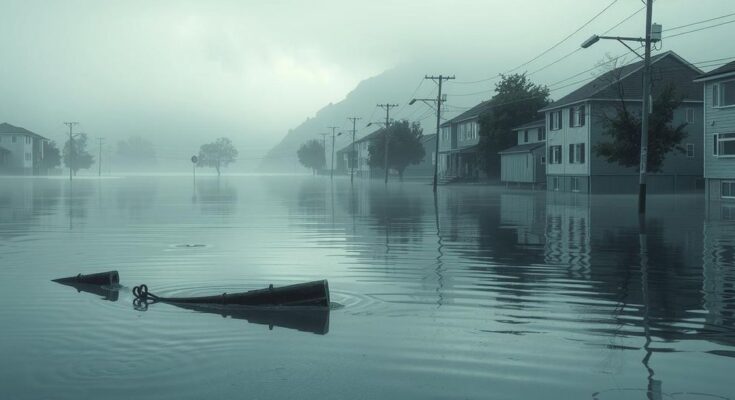In Banjul, The Gambia, rising sea levels threaten to submerge the city, exacerbated by climate change and sand mining. Recent floods impacted over 50,000 people, leading to significant population decline. However, projects like the Climate-Resilient Banjul initiative show promise for revitalization and combating environmental challenges.
A city in West Africa faces the threat of transforming into an underwater ghost town as sea levels continue to rise dramatically. The rise in temperatures, accelerated since the 1800s due to industrial activities, exacerbates this issue, placing cities like Banjul, The Gambia, in grave danger. Recent torrential rainfall in July 2022 has already resulted in substantial flooding, affecting over 50,000 residents, according to The International Federation of Red Cross and Red Crescent Societies.
The implications of rising sea levels for Banjul are dire. James F.P. Gomez, the Minister of Fisheries, Water Resources, and National Assembly Matters, warns that a mere one-meter rise could submerge Greater Banjul completely. The city’s historical vulnerability has been intensified by climate change and the detrimental effects of commercial sand mining, leading many residents to express concern about their future. Aminata Jatta, a local gardener, lamented, “The sand mining has devastated our lives” – Dialogue Earth.
Banjul’s population has notably decreased from 45,000 in 1983 to a projected 26,000 by 2024, with many residents contemplating leaving due to the adverse impacts of climate change and reduced employment. Research conducted by Nfamara K. Dampha reveals that 64% of the current population intends to migrate by 2050, indicating a looming crisis.
However, initiatives to combat these challenges are underway. In November 2024, The Gambia secured $12 million from the Global Environment Facility for the Climate-Resilient Banjul project, emphasizing landscape-level transformation. Moreover, the EU-funded City-link Ostend Banjul project aims to strengthen the coastal defense by planting thousands of coconut trees and vegetation, enhancing the city’s resilience against rising sea levels.
Banjul is not alone in facing climate change challenges; regions in British Columbia, Canada, are also at risk of flooding. Reducing reliance on fossil fuels and transitioning to cleaner, renewable energy sources are crucial steps in addressing climate change effectively. Collective efforts can significantly mitigate its impacts on vulnerable communities worldwide.
Banjul, The Gambia, confronts the threat of submersion due to rising sea levels and climate change, having already experienced devastating flooding. With initiatives like the Climate-Resilient Banjul project and efforts to restore coastal defenses, there is a glimmer of hope for the city. However, the urgency to adopt sustainable practices and lessen dependence on fossil fuels remains critical for the city’s future and similar vulnerable regions globally.
Original Source: www.thecooldown.com




